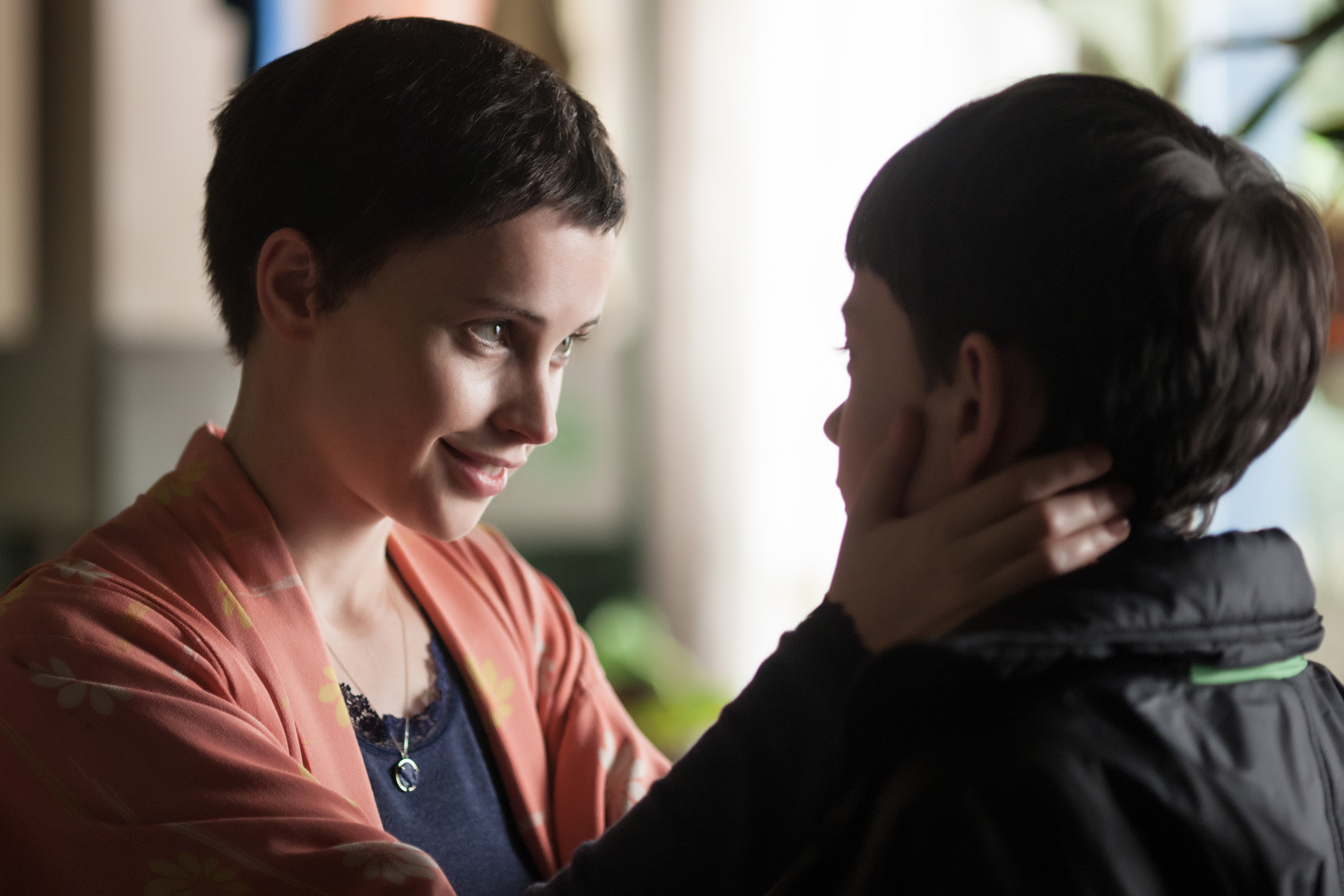
Exclusive Interview with Felicity Jones of A Monster Calls
A Monster Calls is a visually spectacular and unabashedly emotional drama from director J.A. Bayona (“The Impossible”). 12-year-old Conor (Lewis MacDougall) is dealing with far more than other boys his age. His beloved and devoted mother (Felicity Jones) is ill. He has little in common with his imperious grandmother (Sigourney Weaver). His father (Toby Kebbell) has resettled thousands of miles away. But Conor finds a most unlikely ally when the Monster (portrayed by Liam Neeson in performance-capture and voiceover) appears at his bedroom window one night. Ancient, wild, and relentless, the Monster guides Conor on a journey of courage, faith, and truth that powerfully fuses imagination and reality.
This is one of my favorite movies I’ve seen in a long time. It will touch you and sit with you for a long time after you see the movie. To read my review of the movie check out our post here. As I mentioned in the review, be sure to bring along some Kleenex with you to the theater. I don’t think there was a dry eye in the theater.
After seeing an early screening of A Monster Calls we had a chance to interview the lovely Felicity Jones at The Four Seasons Hotel. Here is part of our interview with Ms. Jones who opens up about about the movie means to her and what she came away with from the experience.
FELICITY: Hi, hello everyone.
Q: Hello.
FELICITY: Hello.
Q: So we saw an early screening this morning at nine.
FELICITY: That’s good, that’s very devoted.
Q: It’s such an emotional… emotional film. So what was it about the script that appealed to you, and spoke to you?
FELICITY: Well, it was a combination of, uh, reading the script and then, um, I read the book. I actually read it when I was on holiday and I was on holiday with a couple of friends. And then I was so overwhelmed after I’d finished it, I had to-I said, “Just going to be two minutes,” and then I sort of crept off and went into the sea and just like burst into tears. ‘Cause it just hits you in that gut level, and I just thought, “Well, if-if the book can be that, then-then hopefully the film can, too.”
FELICITY: And then I met with Bayona and he was just very-I could just see he has such honesty in what he does in his work, that he would-he would just do such a truthful and unsentimental film, really.
Q: Yeah, I don’t think there was a dry eye in the whole theater.
FELICITY: [LAUGH] I know. Oh. Well, I’m sorry but… [LAUGH] But it’s great. [LAUGH]
Q: Can you talk about working with-with Lewis? Like, he’s unbelievable. Just amazing.
FELICITY: Yeah. He’s such a wonderful young actor. He takes it very seriously. He works incredibly hard, and he’s really really bright. He’s just-He just had it. I mean, it wasn’t like we had to do anything special for him, or do, you know, we were-we were just all in awe of him really, and-and he gave it everything. It was, yeah. He’s just from the-from the very beginning, he’d, you know, you’d be sitting around a table, and he just always come out with the most kind of insightful, credible things and ideas about the character and the script.
FELICITY: And we’d all sort of turn around and go, “God, you’re amazing!” [LAUGH] So, uh, so from, yeah. He’s just was… He’s just a true actor. W-Yeah. Didn’t have to patronize him or, you know, he’s, yeah… Very, um, very good at what he does.
Q: So, as Melissa said, we were one hot mess earlier in the morning, and-and the movie is absolute-it’s devastatingly beautiful. And as a single mom, and as a mom, I was just… I-It’s every fear that you ever have as-as a parent. So, and I-and I follow you, and you’ve, um, been in some pretty, um, dark movies and, you know, and so I-I-what drew you to this particular movie?
FELICITY: Uh, I think, um, I think it was the authenticity. Um, I hope you found that. That it was-it just felt very real. It felt…
Q: Raw.
FELICITY: Yeah. It felt honest, and it didn’t feel like it was, um, it was trying to sort of, um, pretend that things are more, uh, easy then they are in reality. It was just, it felt very truthful. And um, and I think, you know, I grew up with my-my… I was very close to both my parents, but I grew up with just my mother, and she was, a-a-a single parent, and-and I guess some of that resonated when I was reading the script, and that-you know-that-that sort of touched me, that side of it, that she, you know, in s-many ways, she’s-they’re kind of friends.
FELICITY: They’re-They’re not, um, they’re not that strict parent-child relationship. They really respect each other, and-and they, um, want to keep you know, hanging out with each other on a fundamental level. And it’s just, yeah, the honesty of trying to deal with-with that situation.
Q: Beautiful. I love the fact it depicted real life. And my favorite-one of my favorite lines throughout the whole movie was “Not everyone lives happily ever after. It’s messily ever after.” And it’s true. Life gets messy and you’ve got to make the best out of it.
FELICITY: Yeah. Yeah. Always. [LAUGH]
Q: So… It was just remarkable. It was just absolutely remarkable. So, thank you.
FELICITY: Thank you.
Q: Hello.
FELICITY: Hi.
Q: What do you want people to take away from the movie?
FELICITY: Um, I always think, you know… I like films where you either laugh your head off for a couple of hours or you-or you’re in tears, you know? It’s something, I think, just to be moved by something, and, uh, and I hope people think about it afterwards, and it stays in their heads, and-and [it?] somehow, you know, i-i-we all have seen films, and you’ve thought, “I’m going to do something differently, having seen them.” And I think-I think that would be, at its best, that way-that’s what you’d hope for.
Q: Hi, um, I think you’re wonderful. I saw you in The Theory of Everything, and…
FELICITY: Thank you.
Q: I’m enjoying seeing you burst onto American scene. And um, I’d just like to know what, uh… You’re a very serious actress, an emotional actress. Do you, uh, choose these types of movies over other blockbuster films? I’m sure you’re getting a lot of offers, left and right. So, I mean I know you are in a few more movies coming up soon, but do you have a preference, or…
FELICITY: Uh, I think I like, I mean it’s the do you, I imagine you like seeing blockbusters and seeing indies, and-and I feel the same. It’s like, it’s nice to do the mix, really. And um, and it-and it’s-it depends on the character, and if I feel engaged by it. You know, you always know when you sit down and read a script, and you don’t move, that it’s something good. When it’s not good, you just, you’re like, making tea, or you’re going “All right, ugh, I can’t believe I’ve got to read this.” [LAUGH]
FELICITY: Uh, so, so if I sit down and you’re kind of engaged by it, then you think, “Oh, there could be something in this.” So, uh, I think it’s always vari-variety’s the spice of life, I think. So [LAUGH] you know. Try different things out.
Q: How did you prepare yourself, or did you do any research to play a chronically ill, or cancer patient?
FELICITY: Uh, yeah, I do, I like to do a lot of research. I like to kind of get really stuck in and understanding what that person is going through, and so I met with women who had gone through, uh, have had cancer, and luckily had survived it, and I went and met them. Um, I spoke to a woman, very, she was very open about the emotional side of it, as-as-as well as the kind of physical side of how chemotherapy affects, you know, affects every bit of your body.
FELICITY: So it was a very very open dialogue, and then I spoke to her doctor, and her oncologist about kind of, you know, the specifics, the kind of m-m-medical facts of that. So, I just kind of attack it in every different direction, and um, and-and try and find the absolute, uh, honesty of that experience. But also at the same time, I get-all I found with these women who, you know, they just didn’t want to be defined by it, and it was constantly… The thing that appears always the same, is like people [are?] just want to go back to being normal.
FELICITY: And I just want it, I just, you know, you just want it to end. And so it was trying to find, okay, who is it-it… You don’t want to… The illness doesn’t want to be the defining thing. It’s like, who is Lizzie? You know, she’s kind of a rebellious teenager, really inside. She had Conor when she was so young. She’s still dealing with her own issues with her mother. Those haven’t been resolved. So it was-it was concentrating on that, and then the illness be a kind of, um, secondary to the-to the person.
Q: So um, the women, uh, that you portray are very, like, strong and feminist and kick ass. [LAUGH] Um, even-even in this movie, like, she’s fighting till the bitter end. So do you, uh, what do you see in all of these women? What do they all have in common? Or if-if you see that at all?
FELICITY: Um, [I don’t?] What do you think? [LAUGH] You probably know better than me. [LAUGH] Um, yeah, go on. [LAUGH] Oh, okay. [LAUGH] We’re being very polite. Um, I do. I-I do. I guess I’ve been surrounded by very strong women in my life, and I’m always keen to show them as honestly as possible, and-and all the sides, and the strong bits and the more vulnerable sides. But also, you know, not just women, just human beings, you know.
FELICITY: What is it that makes us human, and it’s, um, it’s-it’s trying to be strong when-when, even when things are really hard, but that’s difficult, and-and-and you often have to make compromises. So, uh, I don’t know. I mean, I guess in some ways they’re all survivors, uh, deep down. That they all, um, and they all have strong beliefs, um… But I-I don’t know. I’m always keen to keep changing it up as well, and do something very silly as an alternative. [LAUGH] Just to keep it fresh.
Q: Hi. How did the film help you grow as a person?
FELICITY: Um, it’s often quite, it’s an interesting question, ’cause it’s hard t-it’s hard to kind of quantify it. I think you, I definitely, a lot of my friends’ parents have um, have had cancer, and um, and I-i-i-it leant me a little bit more under-understanding into their experience. I think, in a way, it gave me a little bit more empathy. I think, I think that would be it. Yeah. Thanks.
Directed by J.A. Bayona (“The Impossible,” “The Orphanage”)
Written by Patrick Ness, based on his novel A Monster Calls
Starring Sigourney Weaver, Felicity Jones, Toby Kebbell, Lewis MacDougall, and Liam Neeson
For more info:
Official Site I Facebook I Twitter I Instagram
#AMonsterCalls
0





